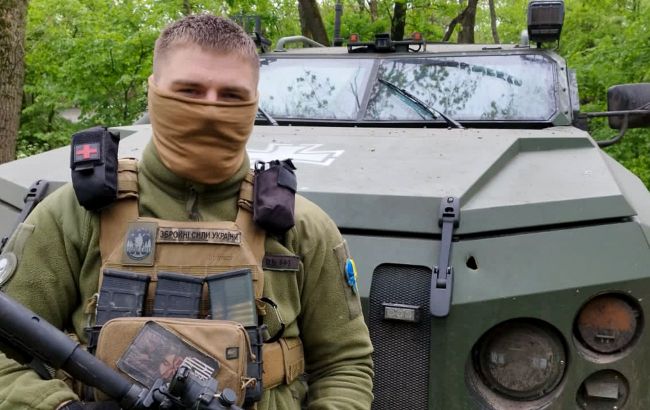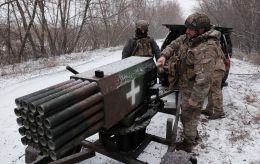We have broken the backbone of the Russian empire in Bakhmut: reconnaissance man on Ukraine's resistance
 Volunteer reconnaissance man of the "DaVinci Wolves" battalion
Volunteer reconnaissance man of the "DaVinci Wolves" battalion
Military volunteer on encountering a full-scale offensive, fierce battles in Bakhmut, communication with civilians, and the future of Ukraine in an article by RBC-Ukraine.
Heorhiy, a volunteer and former history teacher, now a Ukrainian soldier from the reconnaissance group "Dyke Pole" (Wild Field) in the battalion "DaVinci Wolves," is currently conquering the roads of Donbas.
He joined the war at the beginning of the Russian-Ukrainian conflict and later became the leader of one of the units in the "Sokil" organization. He conducted training and shared his combat experience with the youth. His unit is now stationed on the hottest front line in Bakhmut.
Heorhiy shared his insights with us on Russian tactics, celebrating his second birthday under siege in Soledar, and the psychological state of civilians.
On the start of the Russian invasion
On February 24th, I couldn't sleep. I stayed up until almost 2 a.m. following the news. Various military chats had already been publishing information that at around 1 a.m., the military forces associated with the airborne troops were on high alert. Later, tank and infantry units joined them. I already understood back then that it wasn't just a training alarm.
A friend called me at 4:30 a.m. and said that the war had started. I gathered my belongings and went home. I arrived at my mother's place, helped her buy supplies and medicine, and then went to the military enlistment office. My brothers-in-arms from "Sokil" were already there. There were a lot of people, long lines. I received a weapon immediately. I had combat experience already because I had been a military volunteer since 2015.
We were waiting and preparing to defend Poltava. The unit I was in at that time participated in the "Hadiach safari" when local forces clashed with Russian columns of military vehicles in northern Poltava region in February.
I had strong emotional rollercoasters at that time, from despair to the feeling that I had to perform an honorable deed and take as many enemies with me as possible, rather than just die myself. The Russians came for us, for people like me. But after the guys on Zmiinyi Island said those now legendary words, I felt a powerful surge of strength. Their words, their actions were truly heroic. They inspired me greatly.
Until January 25th, I served in a territorial defense unit, then transferred to the reconnaissance group "Wild Field" in the "DaVinci's Wolves" battalion. I am involved in defending the road to Khromove near Bakhmut. We are holding off the enemy with great efforts.
On Bakhmut and Russian tactics
The Russians sent a significant number of their forces and reserves to Bakhmut, which they could have sent to other directions. Conquering the city became their goal. But our defense was resilient, and we had a more advantageous position than the enemy.
I can't say we have defeated them yet, but we have worn them down. We did everything to make them suffer far greater losses than they achieved during their offensive.
Regarding Bakhmut, it is a logistical center where two roads converge: one leads to Kostiantynivka, and the other to Sloviansk. It is geographically located in an area with slopes and hills. There is currently infantry warfare going on there.
I closely followed the entire operation in Bakhmut. The enemy's tactics varied. Initially, they focused on quickly entering the city, but it didn't work out. The level of training of the "Wagner" infantry was insufficient to establish a foothold in the city. So they were repelled several times on the outskirts.
Then they started operating more professionally, using artillery and aircraft. But that didn't work either.
Afterwards, the plan changed, and they began "cutting" the flanks: Soledar and Klishchiivka. That's when a substitution of "Wagner" fighters with regular army and airborne forces happened. After their success on these flanks, the main strike was directed at Bachmut, while a diversionary attack was launched in the direction of Soledar.
Now the tactics are standard: "cannon fodder waves" of "Wagner" fighters, but covered by artillery and drones. In Bakhmut itself, the enemy's tactics are assault-oriented. "Wagner" groups move house by house. They advance aggressively, aiming at quarters where our forces are located, using artillery. They destroy buildings that could serve as strongholds using aircraft to drop guided bombs, which is what they've doing for a long time now.
The road to Khromove, also known as the "road of life," was initially almost captured by the "Wagner" fighters, but our troops repelled them and currently control it. Our unit has done a lot for this.
The Russians fought for Bakhmut for quite a long time. As of today, the city has not fallen. It is a proud fortress for which we have lost thousands of lives, but we have broken the backbone of the Russian empire. It will eventually fall completely in its final war, and it will be stopped by Ukraine itself.
On the battle in Soledar
When I was still in the territorial defense unit, we were sent to Blahodatne, a village on the outskirts of Soledar. The "Wagner" fighters launched an assault early in the morning. Another platoon from a different territorial defense unit was sent to reinforce us. There were fierce battles, and our fighters put up strong resistance, but it was very challenging. There were defeats and many casualties.
On the morning of January 20th, we were going to the positions to relieve the guys and saw people from that unit carrying a wounded soldier. Suddenly, a mine hit them, and one cargo 300 turned into four of them.
My comrade and I rushed over, called another soldier, and started helping. Unfortunately, one fighter died from blood loss. We carried the others to the evacuation point. We loaded them onto an armored vehicle. I was standing behind it, and suddenly a missile from an anti-tank launcher hit the vehicle. The missile hit the armor and just crumpled due to the impact force, but it didn't explode. I was standing right where the projectile could have detonated. If that had happened, I would have been torn apart by the shrapnel.
That's how I stayed alive. The armored vehicle drove off, and I continued to carry out the assigned tasks. A week later, I found out that the vehicle never left Blahodatne. The anti-tank guided missile struck it right in the middle of the road. Most of the people inside the armored vehicle died.
On inappropriate questions in civilian life
The questions that trigger the most are those like "How many people have you killed?" or "Have you shot at people?" And there are constant questions from civilians about counteroffensives. But how would I know? I'm not the one organizing them. It's important for military personnel to communicate, of course, but not about everything. We talk, but only about what we can. It's better not to pry.
For me, war is a way of life. Participating in fierce battles makes you realize that life is fleeting. That's why I try to live here and now, in the moment, to do as much as possible, and if possible, to keep in touch with my loved ones.
I want to end this war. To make our descendants proud because we were able to accomplish something the previous generation couldn't - to defeat the enemy.
On war and peace
When you spend months at war, you forget what civilian life is like. When I came home on leave, I would enter the house, drop my things, sit on the couch, and not know what to do. There, I had tasks, I would perform them, sleep, and then go back to doing it all over and over. Everything was clearer there.
Peaceful life seems easy, but the emotions are different. I often think about my comrades who died. Whenever I return to "civilian life," I go to their graves. I lay flowers, talk to them, and tell them that we continue to fight and have not forgotten them.
I wish civilians would be reminded of the war more often. And I want them to remember it is still ongoing. Every day, hundreds of heroes die protecting civilians.
The first thing I want is to end the war with our victory, and the second thing I want is to live. I want life to overcome death, not the other way around. I fight for the lives of my loved ones, friends, acquaintances, comrades, and for the memory of those we can no longer bring back. I often think of them, I would like to talk to them, do things differently, maybe save someone. But unfortunately, it's not in my power.
On the Ukrainian army in 2014 and 2022
The Ukrainian army of 2014 differs from the one of 2022 in terms of adaptation and skill. Obviously, the battles today are not the same as those in the Anti-Terrorist Operation (ATO). This is a real meat grinder. But we have learned to fight and not be afraid over these years.
Being a volunteer soldier today is not the same as being a volunteer in 2014. Back then, we were the first and didn't know where we were going or what we were facing. Yes, I witnessed the combat actions, then trained others. I told them what war was like, taught them how to handle weapons, we were undergoing training.
However, in reality, the guys didn't fully comprehend what war was up until their first battle. They didn't fully understand that they might not come back.
On the rear and volunteers
I don't judge anyone. Everyone has the right to pursue their own calling. If a person doesn't want to join the army, they can contribute a certain tax or fee they are willing to pay for their freedom. These funds would go towards purchasing body armor or drones for a soldier.
No one can force anyone to join the army, but someone will go join it anyway. Someone who wants to or someone who can. In my opinion, the army shouldn't be a "prison." It should be an example, a source of national pride. Some people should engage in business, some should go to work. We, the military, have chosen this path.
I know many people who were preparing for war. I know many people who are currently preparing for war because they anticipate mobilization or a draft. Some have found their unit and are already fighting. And I respect that, because the war is not over yet.
Honestly, military personnel usually rely solely on volunteers. Since the early days of the full-scale invasion and even now, they continue to provide us with the necessary items for the war effort. Our volunteers can do anything, and I believe that we will definitely prevail with such a strong rear.
If it weren't for the volunteers, there probably wouldn't have been an army in 2014. And in 2022, there wouldn't have been such resistance without volunteers. I remember how people gave everything for the soldiers in the early days of the war. They literally saved us from hunger and cold.
On a future without Russia
I envision Ukraine as one of the best countries in Europe. I see it as economically attractive, strong, beautiful, and, most importantly, free. The kind of country I would like to live in, and that our future generations would want to live in. A country without Putin, without Russia, and the suffering they bring.

